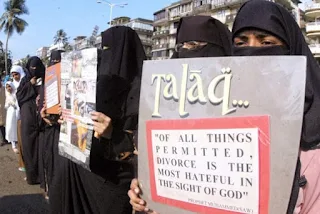Men
are guardians over women by (right of) what Allah has given one over the other
and what they spend from their wealth. (An-Nisa, 4: 35)
In the same verse Allah (swt) continues
to say that righteous women should be devoutly obedient, guarding in (the
husband’s) absence what Allah would have them guard, even if nobody is watching
them.
Therefore, based on this Qur'anic verse,
the husband’s responsibility to fulfill his duties towards his wives is as
important as those of the wives (or wife, should he have only one) towards
their husband. And the Qur'an makes us understand that a husband has a little
more authority upon his wife/wives than the latter upon him.
This verse of the Qur'an also shows that
both man and wife enjoy each, rights (which have been bestowed to them by
Allah) and which they have the right to demand from each other. And Allah (swt)
has also showed the relation and responsibility which must exist between
husband and wife whereby each one knows his/her rights.
Allah says in the Holy Quran: “They are an
apparel (garment) for you and you are an apparel for them.” (2: 188)
By revealing this verse, Allah (swt)
wanted to make us understand that the rights of both the husband and wife are
equal. You all know that garments are meant to cover our body, especially its
defects. Moreover, garments are means to embellish ourselves, man and woman and
to protect us from heat and cold.

By likening the
husband and wife as garments, Islam wants to show that a good wife is one who
protects the honour and dignity of her husband, and she does not go outside and
relate to creatures the defects/weaknesses of her husband, and similarly a good
husband is one who does not humiliate, blame or relate the defects/weaknesses
of his wife with others. This is the beauty of Islam, whereas the garment
mentioned means Purdah (covering).
The beauty therein is the way in which the woman must neither uncover her
beauty nor her clothing before other men. She is to reserve that right to her
husband. As for the husband, he is to remain loyal to his life (he must not
lead a bad life). It is then that there shall be peace, tranquillity and
blessings in their household.

.jpg)
























